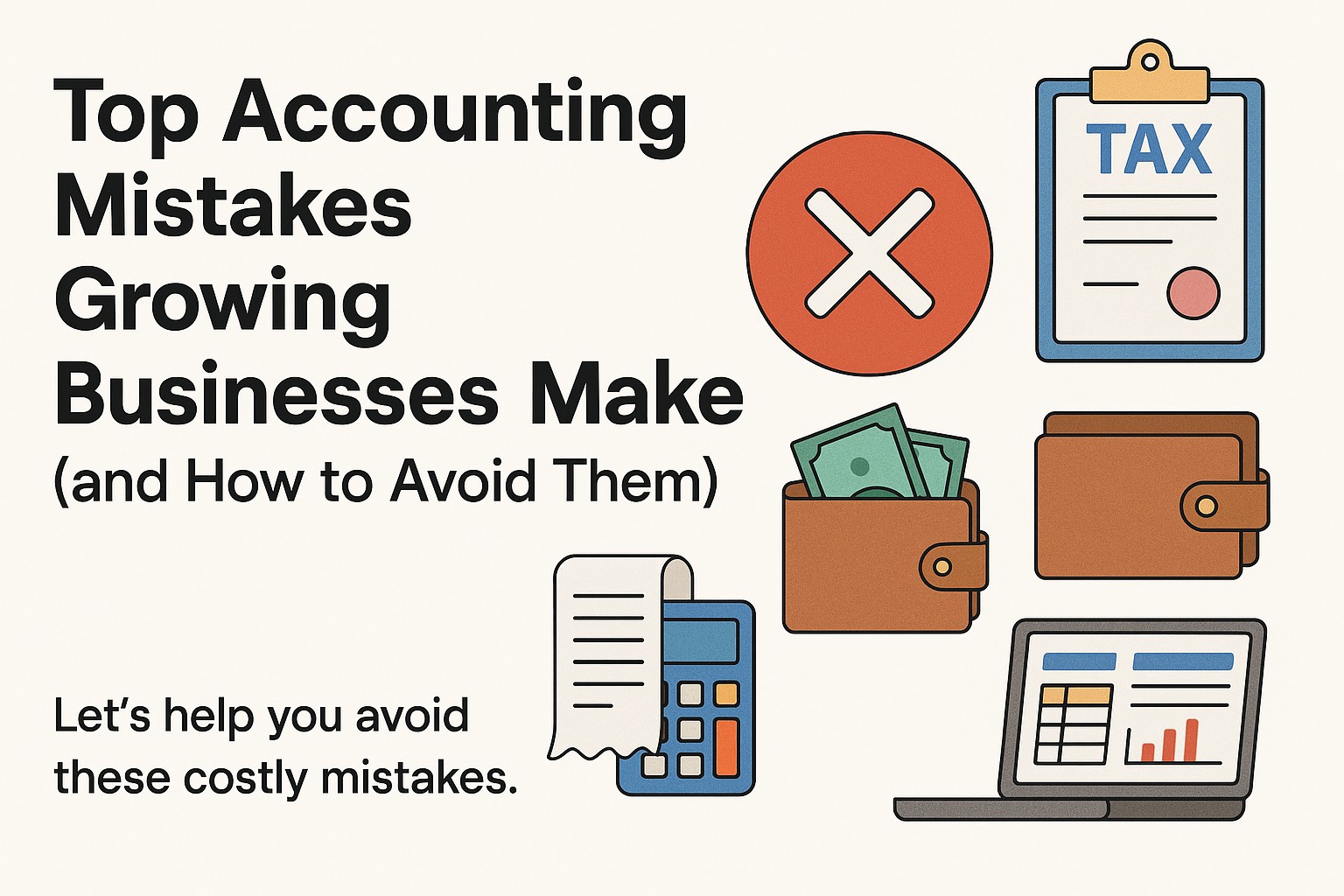
Top Accounting Mistakes Growing Businesses Make (and How to Avoid Them)
Growth is exciting—but it also brings complexity. For founders, operations managers, and CFOs, one of the biggest risks during expansion isn’t marketing or sales. It’s accounting.
While many fast-growing companies focus on scaling revenue, poor financial practices can quietly sabotage progress. Whether it’s missing tax deadlines, misclassifying expenses, or relying too heavily on DIY tools, these mistakes compound quickly.
Let’s break down the most common accounting errors we see in growing businesses—and more importantly, how to avoid them.
Top Accounting Mistakes Growing Businesses Make (and How to Avoid Them) – Table of Contents
1. DIY Bookkeeping Gone Wrong
The Mistake:
Using spreadsheets or basic accounting software without proper knowledge can create messy, inaccurate records. Many businesses start off with someone in-house “just doing the books,” but as transactions multiply, this becomes unsustainable.
Why It Matters:
Errors in reconciliation, revenue tracking, or expense categorization lead to faulty financial reports—and bad decisions.
How to Avoid It:
Outsource to a professional early or bring on a part-time CFO. Investing in structured financial oversight saves time, money, and stress down the road.
2. Poor Expense Tracking
The Mistake:
Throwing all receipts in a shoebox—literally or figuratively. Without a reliable method for recording expenses, you risk losing deductions and misrepresenting your cash flow.
Why It Matters:
Sloppy expense records lead to cash flow surprises and IRS red flags.
How to Avoid It:
Use a digital expense tracking tool (like Expensify or QuickBooks), integrate it with your accounting system, and train your team to submit receipts regularly.
3. Mixing Business and Personal Finances
The Mistake:
Blurring the line between personal and business accounts, especially common among solo founders or early-stage teams.
Why It Matters:
This not only complicates bookkeeping but can jeopardize legal protections and lead to tax issues.
How to Avoid It:
Create dedicated business accounts. Establish clear policies on spending and reimbursements. And yes—pay yourself like an employee, not a cash drawer.
4. Not Reconciling Accounts Regularly
The Mistake:
Failing to match bank statements with accounting records on a monthly basis.
Why It Matters:
Without reconciliation, you might miss fraud, double payments, or customer payment delays.
How to Avoid It:
Set a monthly reconciliation process—automate it if possible—and review discrepancies as they appear.
5. Late or Missed Tax Filings
The Mistake:
Scrambling at the last minute, only to realize you forgot payroll taxes or underestimated quarterly estimates.
Why It Matters:
Late filings can trigger penalties, audits, or worse—damage to your company’s reputation.
How to Avoid It:
Work with a tax advisor to set reminders, automate submissions, and build tax planning into your quarterly strategy—not just April panic.
6. Ignoring Cash Flow Management
The Mistake:
Assuming profit equals cash in the bank. It doesn’t.
Why It Matters:
Many businesses look profitable on paper but struggle to meet payroll because they’ve ignored timing gaps between receivables and payables.
How to Avoid It:
Develop a rolling cash flow forecast. Review it weekly. Plan for seasonality, slow payments, and expansion costs.
7. No Financial Reporting or KPIs
The Mistake:
Only checking in on finances at tax time—or never.
Why It Matters:
Without reporting, you can’t track margins, spot trends, or pivot effectively. You’re flying blind.
How to Avoid It:
Establish regular financial reporting—monthly income statements, balance sheets, and KPI dashboards. Review them with someone who can explain what the numbers mean.
8. Hiring an Inexperienced Bookkeeper or Accountant
The Mistake:
Opting for the cheapest option instead of a partner who understands your industry and growth stage.
Why It Matters:
A poorly trained bookkeeper can cost you more in mistakes than you save in fees.
How to Avoid It:
Vet your accounting team. Look for experience with companies at your scale, and ensure they can guide—not just record—your financial growth.
9. Overlooking Compliance Requirements
The Mistake:
Failing to comply with state filings, payroll laws, sales tax nexus, or employee classification rules.
Why It Matters:
Non-compliance can trigger audits, fines, or lawsuits.
How to Avoid It:
Stay proactive. Work with professionals who stay current on regulatory changes and build compliance reviews into your operational checklist.
10. Not Planning for Growth Financially
The Mistake:
Expanding without understanding the full cost—new hires, equipment, software, etc.
Why It Matters:
Scaling without a financial plan can put your cash reserves at risk and create unsustainable burn rates.
How to Avoid It:
Develop a growth forecast. Create multiple scenarios, calculate runway, and get strategic input before making big moves.
Our Thoughts
Accounting is more than a back-office task—it’s a strategic foundation. Avoiding these common mistakes can be the difference between thriving and floundering.
Growing businesses need more than just a service provider. They need a partner who can help them build strong, scalable systems.
✅ Let’s help you avoid these costly mistakes.
Schedule a consultation today to see how we can streamline your accounting and give you the clarity you need to grow with confidence.

